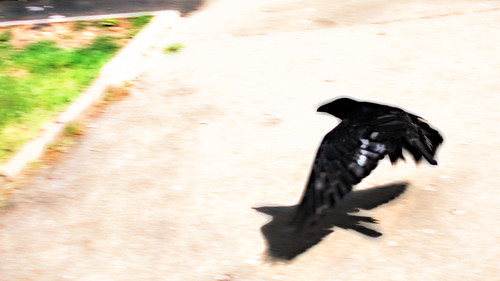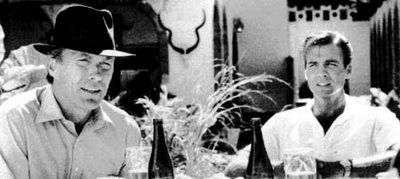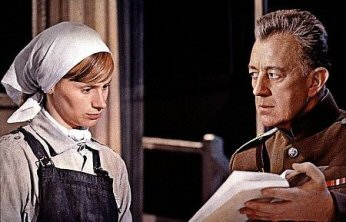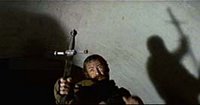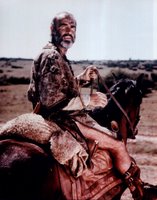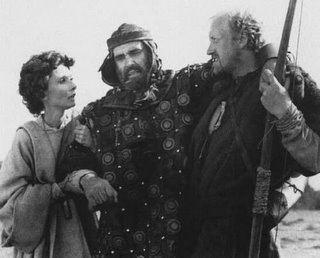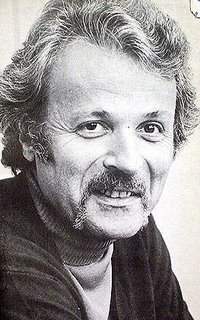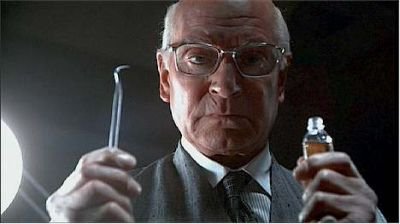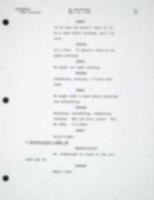Last week, I talked with
Gordy Hoffman, writer-director and founder of the
BlueCat Screenwriting Competition. The deadline for this year's BlueCat is March 1, 2007. Grand Prize is $10,000, five finalists win $1500. BlueCat gives written feedback on every screenplay entered. Entry fee is $45.
Gordy Hoffman, teaches screenwriting at University of Southern Calfornia's School of Cinematic Arts. He oversees the BlueCat competition with film festival producer and publicist, Heather Schor.
And yes, Gordy is the older brother of Academy Award winning actor Phillip Seymour Hoffman. But writing is actually a lot harder than acting. I've done both, and it's totally harder being a writer. Trust me. It is.
---
Neal Romanek: I see by
BlueCat's MySpace page that you're a scorpio?
Gordy Hoffman: Actually I am a libra. Heather is a scorpio
Neal: Ah, I see. Yes, it actually also says that you're female too. So, yeah, that must be Heather.
Gordy: Yes.
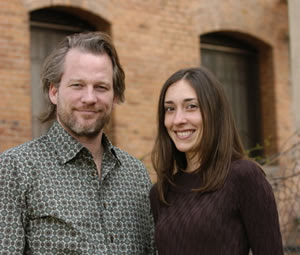
Neal: So when and how did you start the BlueCat Screenwriting Competition?
Gordy: I started BlueCat back in 1998. I had the idea for awhile, having gone through experiences myself as a screenwriter submitting to various contests. So I went and ahead and set up a website and started this journey.
Neal: Obviously there are lots of screenwriting contests out there now. Do we need another one? Do we need BlueCat?
Gordy: There were a lot of contests when we started too, in 1998. But, yes, there are so many more now. BlueCat provides a service to screenwriters. It would be much easier for us to not provide written analysis to every person who enters. Most major competitions do not read past page 30. But we do. I also believe we strive to read and adjudicate our submissions fairly and honestly, and this has led us to great discoveries.
Neal: What was it like for you entering contests as a writer? And how has that affected how you've structured the BlueCat Competition?
Gordy: I hated that I never knew why I didn't win. This is why we give analysis to all the BlueCat entrants. I also hated that it seemed to cost so much to enter. Our fees have always been low, probably too low, and it's still fair. And I love that you can use the contest deadlines to force yourself to write. That's valuable.
Basically, I am a director and a writer. I am not a screenplay contest entrepreneur. This is not a good way to become rich. The heart of BlueCat has always been in the right place. We want to serve writers in their dream to become better. This is what satisfies us. "Us" meaning "me and Heather". So, as a writer, I am in there for the fight.
Neal: So you can't get rich doing a contest? Bummer.
Writers tend to be isolated. Have you been able to develop community among screenwriters via BlueCat?
Gordy: We have a great MySpace page, and this has been amazing, but no, we don't have the community that we would like. We will be opening a conventional forum shortly, but I would really like to take the idea of community and peer review beyond the Zoetropes and TriggerStreets. I would love to develop a way that the mechanism of the contest can happen within a large group of writers, where they discover themselves, and there's a carrot at the end. Something akin to the Sundance Lab, but beyond, where production of the screenplay is realistic. I would love to get any input from your audience on what they would want. Let's make this happen. There should be something beyond just reading each other's scripts.
Neal: Well, web media makes all that so much easier. It's really a change from the idea of the writer in the room who hopes to one day make it big and he'll be "discovered".
Gordy: Yes, exactly. And shooting on HD makes production change.
Neal: Do you ever have the sense, in doing a contest, of being a middle man between the writer and money people?
Gordy: BlueCat is a middle man, a very good one. We don't take money from the screenplays we set up. I think we might take an executive producer credit in the future, but no money. Writers want BlueCat to be that bridge.
Neal: Yes. There's always that hope that writers have: "If I win a contest, then I'm much more likely to be noticed by…fill-in-the-blank..."
Gordy: Well, it's true. Our 2005 winners were about to give up, and now they are repped by UTA and their movie will be out this year, GARY THE TENNIS COACH
Neal: Great. And the better your winners do..
Gordy: The better the winners do, the better everyone who enters does, as our ability to serve our mission grows. Every year, it gets easier to plug people into the industry.
Neal: So do you also have contact with producers, studios, agents? Ideally you would want them to be as interested in contest deadlines and announcements as the writers, right?
Gordy: BlueCat is on everyone's radar. Every one in town knows about Gary the Tennis Coach (Rick Stempson, Andy Stock, writers) Seann William Scott stars and Danny Leiner is directing. These are studio-approved professionals that have been directly involved with profitable product. So when they pick a screenplay from a competition, every one comes running. That's how it works. I personally handed the screenplay to a producer, Peter Morgan, that I had a professional relationship with. He took it from there. Yes, we have contacts. That's how they movie got made. BlueCat's contacts.
Neal: So is there The BlueCat Agency in the future? BlueCat Management? BlueCat Studio?
Gordy: No, we don't want to represent writers. We want to discover and nurture gifted artists, and then introduce them to a professional network. Would we like to award a greenlight every year? Yes. We're working on that.
Neal: An agent friend of mine said that he never looks at contests. That he thought contests were not worth entering. And were not worth an agent's time looking at.
Gordy: I don't think UTA thinks that anymore.
Neal: That is a very good answer.
Gordy: Most contests focus on driving up the number of entries and they don't focus on adjudication. If you look at our winners, they keep winning. They are real screenwriters. We pride ourselves on our eye for talent. Not every contest can find great scripts. This hit me like a ton of bricks this year. I saw this unimpressive screenplay I had read win a major contest. Suddenly I understood that there was a big difference in the judging. Listen everybody: Judges are not all the same!
Neal: There's always that paranoid suspicion that every writer - rightly or wrongly - has that they are much smarter than the people judging their writing.
Gordy: Writers always think they're smarter than people who don't like they're writing. I always do, initially - then I try and gain value from every comment.
Neal: How did you begin teaching at USC? My alma mater.
Gordy: One thing led to another and I found myself with an interview. I didn't want to go it, but I've learned to walk through open doors.
Neal: Helping other writers is vital for one's own writing though, don't you think?
Gordy: Yes, it is vital. Through BlueCat and USC, I have grown immensely. We don't graduate from the school of screenwriting, so I am always open to the mystery of this art.
Neal: I had thought that maybe BlueCat had started as a result of your teaching.
Gordy: No, i started BlueCat in 1998 and teaching at USC in 2006
Neal: What you teaching there, rather.
Gordy: Right now I'm teaching a rewriting class. It's exciting.
Neal: Rewriting. That's where you spellcheck, right?
Gordy: Yes, you just drag your Chewbacca cursor down through your Final Draft file and look for stuff that's lame.
Neal: Exactly.
Gordy: While YouTubing.
Neal: And you just keep going to the last page and checking ... Is 120 yet? … Is it 120 now? … Now is it 120? ...
Gordy: Right. You might want to pad out the dialogue to make it at least 100. Describe someone's shoes a little longer.
Neal: I tend to describe everyone's shoes. To my agent's horror.
Gordy: People describe too much! In an effort to avoid writing the uncomfortable.
Neal: What is the biggest negative you've noticed in the screenplays that have been submitted?
Gordy: They are not writing what is bothering their hearts.
Neal: I hear professionals say over and over and over how few good scripts there are out there. That everything they read is stale and lousy. Then I read scripts by people I know that seem to me to be beautifully written, and fresh, and thrilling, but they say that no one is interested.
Not me, of course. You know, just ... friends.
Gordy: If something is wonderful, the writer might not be persistent. If the world is saying no, I say rewrite.
Neal: If five people tell you that you have a tail, then it's time to check your ass?
Gordy: I refuse to believe there are hundreds of gems that will never be discovered. They're not gems yet.
Neal: So you do believe that eventually the cream WILL rise to the top?
Gordy: Yes. It's the responsibility of the writer to keep showing up as an artist through the process of revision and as a business person by exposing the work. Art and commerce.
Neal: What would you say to the screenwriter about business? I think people tend to believe the business ends with a high concept and proper formatting. I know I have.
Gordy: Compelling story equals hit. But compelling story comes from personally invested, vulnerable work.
Neal: And how do you treat that compelling story you're really invested in like a product?
Gordy: You write what you care about, and bring your craft and diligence, and it works out.
Well, let me respond to your question about product:
If a man who has never made love to a woman comes to a wall, and in the process, finds the love of his life, and the audience wants this happiness for both of them - as we have for ourselves - that makes for a beautiful, compelling story that we would encourage our friends to see. Yes?
Neal: Sure.
Gordy: And with everyone going to see it, the thing makes about 150 million dollars, after everyone tells their friends about this story, this sweet story. And what do we call this movie?
Neal: Shrek? No, um …
Gordy: The 40 Year Old Virgin.
Neal: Ah, right!
Gordy: I think Shrek was about beauty, inner and out. But that was also why it made money, the sweetness.
Neal: But if you're not personally invested in a sweet story, if your taste and voice happens to fall more along the lines of Stanley Kubrick? Then I guess you better be doubly good and work twice as hard in order to pull it off. Like Charlie Kaufman.
Gordy: It's not sweetness all the time, of course. Again, Kubrick was able to rivet us with compelling people in struggle. It's the identification that makes for compelling material. And comedy functions for the audience differently than drama.
Neal: Charlie Kaufman is very sweet too actually, now that I think about it. His films are really all warm & fuzzy at their core.
Gordy: Yes
Neal: So what's the best thing you've seen in scripts submitted to BlueCat? In terms of trend, approach, skill, etc?
Gordy: Just audaciously original choices. People need that. They need to be bold and look within.
Neal: And when they hear a voice say, "This is crazy", maybe just do go ahead and do it anyway.
Gordy: YES! YES!
Neal: I think that's a great note to end on.
Gordy: Thanks, Neal.
Neal: Thank you, Gordy, very, very much.
(end)
---
Labels: screenwriting, writers

